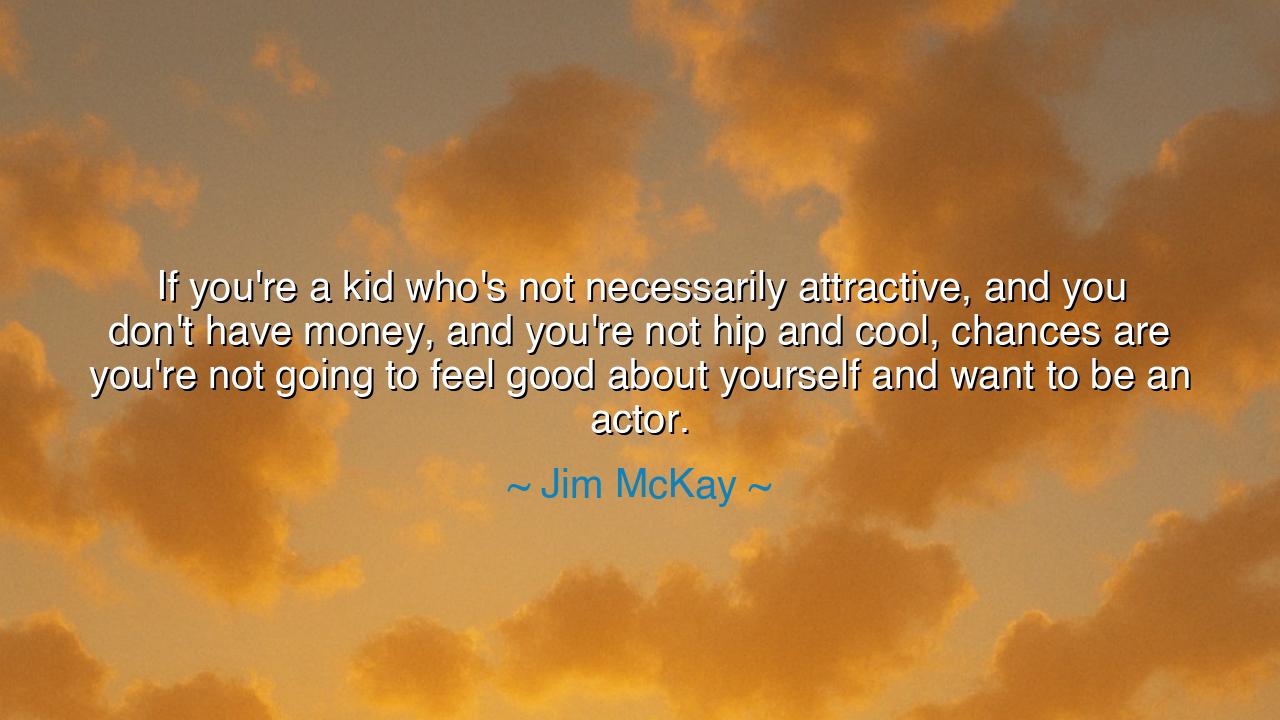
If you're a kid who's not necessarily attractive, and you don't
If you're a kid who's not necessarily attractive, and you don't have money, and you're not hip and cool, chances are you're not going to feel good about yourself and want to be an actor.






In the great tapestry of life, many souls are born into the world without the trappings of beauty, wealth, or status. These individuals, though filled with boundless potential, often feel themselves marked by the absence of what society deems important. Jim McKay’s words, "If you're a kid who's not necessarily attractive, and you don't have money, and you're not hip and cool, chances are you're not going to feel good about yourself and want to be an actor," speak to a truth as old as humanity itself—the struggles of those who feel excluded, diminished by circumstances beyond their control. It is a harsh reality, but one that shapes the lives of many, leaving them questioning their self-worth.
In ancient Greece, the story of Odysseus provides a powerful example of a hero who was not born into greatness but made himself into a legend. Though Odysseus was not the tallest, nor the most handsome, nor the wealthiest of men, he was driven by an unshakable resolve to prove himself. It was his cunning, his wisdom, and his relentless pursuit of greatness that set him apart. Yet, even Odysseus felt the weight of his own limitations, and many times on his journey, he questioned whether he could ever be worthy of the gods’ favor. His story speaks to the ancient wisdom that self-worth is not granted by birth or wealth but forged through determination and self-belief.
Consider the tale of Michelangelo, the master sculptor who, as a young boy, was dismissed by those around him. Born in humble circumstances, with little to his name, he was far from the “hip and cool” figure that the world might have revered. Yet, in his youth, he did not despair; instead, he sought solace in his art. Despite not having the money or the connections of the great artists of his day, Michelangelo channeled his self-doubt into creativity, producing works of such profound beauty that they would echo through the halls of history. Like Odysseus, he overcame the odds by believing in his craft and his vision—by looking within himself for the strength to rise above.
But McKay’s words also reflect a deeper societal truth—that the world often judges people based on their appearance, wealth, or social standing. In ancient Rome, Cicero spoke of the importance of character over external appearances, urging his followers to remember that it is not what we have, but who we are, that defines us. Yet, despite this wisdom, society often continues to reward the superficial, casting aside those who do not fit the narrow definitions of success. For a young person without the trappings of beauty or wealth, it can seem as though the world is closed to them, their dreams out of reach.
In the modern age, we see the same struggles play out, but with new faces and new challenges. Actors, musicians, artists, and dreamers from all walks of life must confront this battle, often against societal expectations that demand they be more than what they are. Like the young people McKay describes, many feel trapped by the world’s narrow definitions of worth and cannot imagine a path to fulfillment. Yet, history shows us again and again that the greatest minds and the most profound talents often emerge from places of struggle, from those who dare to believe that their value is not defined by society’s standards but by their own inner light.
The lesson, then, is one of resilience. No matter the obstacles, no matter the weight of the world’s expectations, it is the power of the human spirit—the belief that we are worthy, even when others may not see it—that shapes our future. If we are to triumph, we must learn to value ourselves not for what we have or do not have, but for who we are. The actor McKay speaks of may not fit the mold, but if they choose to rise above the world’s narrow judgments, they may find that the stage is theirs to command. The path forward, then, is one of self-discovery, of finding within ourselves the courage to break free from the chains of external judgment and forge a new path.
Let us, therefore, take action. Let us invest in the qualities that truly matter: creativity, integrity, and self-belief. If we are not born into beauty or wealth, we can still build a life of meaning and fulfillment. The world may not always recognize our worth, but we must not allow its judgments to define us. Like Michelangelo, Odysseus, and countless others before us, we can rise above the external struggles and find our place in this world, not by fitting in but by standing out through our unique gifts and relentless pursuit of our dreams.






AAdministratorAdministrator
Welcome, honored guests. Please leave a comment, we will respond soon